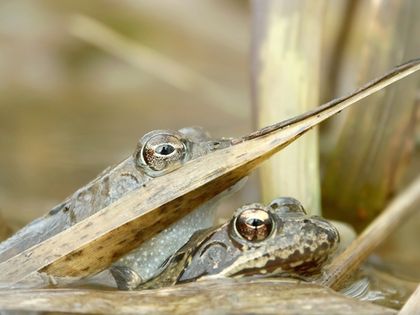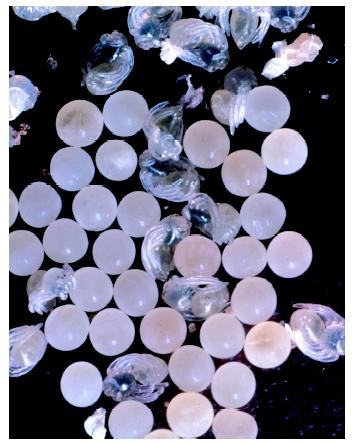Natural Selection

Natural selection is the process by which individuals with characteristics that are advantageous for reproduction in a specific environment leave more offspring in the next generation, thereby increasing the proportion of their genes in the population gene pool over time. Natural selection is the principal mechanism of evolutionary change, and is the most important idea in all biology. Natural selection, the unifying concept of life, was first proposed by Charles Darwin, and represents his single greatest contribution to science.
Natural selection occurs in any reproducing population faced with a changing or variable environment. The environment includes not only physical factors such as climate or terrain, but also living factors such as predators, prey, and other members of a population.
Mechanism of Natural Selection
The mechanism of natural selection depends on several phenomena:
- • Heredity: Offspring inherit their traits from their parents, in the form of genes.
- • Heritable individual variation: Members of a population have slight differences among them, whether in height, eyesight acuity, beak shape, rate of egg production, or other traits that may affect survival and reproduction. If a trait has a genetic basis, it can be passed on to offspring.
- • Overproduction of offspring: In any given generation, populations tend to create more progeny than can survive to reproductive age.
- • Competition for resources: Because of excess population, individuals must compete for food, nesting sites, mates, or other resources that affect their ability to successfully reproduce.
Given all these factors, natural selection unavoidably occurs. Those members of a population that reproduce the most will, by definition, leave more offspring for the next generation. These offspring inherit their parents' traits, and are therefore also likely to succeed in competition for resources (assuming the environment continues to pose the same challenges as those faced by parents). Over several generations, the proportion of offspring in a population that are descended from the successful ancestor

Consequences of Natural Selection
Natural selection is truly the ultimate inventor. A short list of some of its many "inventions" includes flight, celestial navigation, echolocation, insulation, infrared sensors, hypodermic needles, plus all sorts of useful biologically active chemicals such as antibiotics, analgesics, emetics, diuretics, laxatives, tranquilizers, contraceptives, hallucinogens, pain killers, and many, many more. Each of these has been fashioned by natural selection to meet the needs of particular organisms in specific environments.
Pesticide-resistant insects and antibiotic-resistant bacteria are well-documented examples of natural selection in action. In each case, humans have provided the environmental challenge in the form of poisons acting on the population. Preexisting variations in susceptibility to the poison mean that some organisms survive while others die without reproducing. Offspring of survivors have the same variation, and the most resistant of those survive best to reproduce. Over time, populations of resistant insects or bacteria are formed. (This is why taking the full prescription of an antibiotic is important; it kills the entire microbe population, preventing any from reproducing.)
Misconceptions About Natural Selection
Natural selection is easy to understand, but it is misunderstood much too often. Natural selection is not synonymous with evolution. Evolution refers to any genetic change in a population, whereas natural selection specifies one particular way in which such changes are brought about. Natural selection is the most important agent of evolutionary change simply because it results in adaptation of an organism to its environment. Other possible mechanisms of evolution besides natural selection include gene flow, meiotic drive, and genetic drift.
A persistent misconception is that natural selection occurs mainly through differences between organisms in death rates, or differential mortality. Differential mortality can be selective but only to the degree that it creates differences between individuals in the number of reproductive offspring they produce. Reproductive rate, rather than death rate, drives natural selection. A cautious tomcat that seldom crosses busy streets might live to a ripe old age without leaving behind as many descendent kittens as another less staid tomcat killed on a highway at a much younger age. If the short-lived cat leaves more descendants, its genes will spread faster than those of the long-lived cat, and natural selection will favor a short life span. Unless living longer allows or results in higher reproductive success, long life is not favored by natural selection.
Adaptations fashioned by natural selection suit an organism to its particular environment. For instance, a maple tree's broad leaves are well adapted to temperate climates, but unsuited to arctic cold. Similarly, a human's ability to store fat is an adaptation to environments in which fat is scarce, but is poorly suited to the modern fast-food environment. In this respect, natural selection is somewhat shortsighted, since it cannot "see" beyond the next generation.
Natural selection cannot preferentially create favorable variations, but instead must work with what is at hand. For instance, treatment with antibiotics does not create antibiotic-resistant mutants. Instead, it favors microbes that, by chance, already have genes for resistance.
Phrases such as "the struggle for existence" and "survival of the fittest" have had an unfortunate consequence. They tend to emphasize predation and fighting for food as the prevalent means of selection. This reinforces erroneous emphasis on differential death rates, with the strongest and fastest individuals being considered as having a selective advantage over weaker and slower individuals. But if this were true, every species would continually gain in strength and speed.
Because this is not happening, selection against increased strength and speed (counterselection) must be occurring and must limit the process. Animals can sometimes be too aggressive for their own good; an extremely aggressive individual may spend so much time and energy chasing its prey that it spends less than average time and energy on mating and reproduction, and as a result, leaves fewer offspring than average. Likewise, an individual could be too submissive and spend too much time and energy running away from others. Usually, intermediate levels of aggressiveness result in the highest fitness.
Natural selection does not operate "for the benefit of the species." Birds lay fewer eggs during drought years. Is this because competition for limited food supplies would be detrimental to the species, and do birds hold back "for the good of their species"? Such arguments have a fatal flaw: "cheaters" that laid as many eggs as possible would reap a higher reproductive success than individuals that voluntarily decreased their clutch size. Over time, cheater genes would spread through a population, and genes for holding-back would become rare.
However, the same phenomenon can be interpreted more plausibly in terms of natural selection at the level of individuals. During droughts, parental birds cannot bring as many insects to their nest and therefore cannot feed and fledge as many chicks as they can when food supplies are more ample. Laying extra eggs means most chicks would die of starvation. Birds can actually leave more surviving offspring to breed in the next generation by laying fewer eggs.
Any individual that sacrifices its own reproductive success for the benefit of a group is at a selective disadvantage within that group to any other individual not making such a sacrifice. Classical selection will always favor individuals that maximize their own selfish reproductive success. Natural selection recognizes only one currency: babies. Although we might wish otherwise, beauty, brains, or brawn need not be favored unless such traits are translated into more offspring than average. If ugly, dumb, weak individuals pass on more genes, those traits will prevail in future generations.
Whenever one organism leaves more successful offspring than others, in time its genes will come to dominate the population gene pool. Ultimately, natural selection operates only by differential reproductive success. An individual's ability to perpetuate itself as measured by its reproductive success is known as its Darwinian fitness.
SEE ALSO Adaptation ; Convergent Evolution ; Evolution ; Population Genetics ; Sexual Selection
Eric R. Pianka
Bibliography
Pianka, Eric R. Evolutionary Ecology, 6th ed. San Francisco, CA: Addison-Wesley-Longman, 2000.
Comment about this article, ask questions, or add new information about this topic: